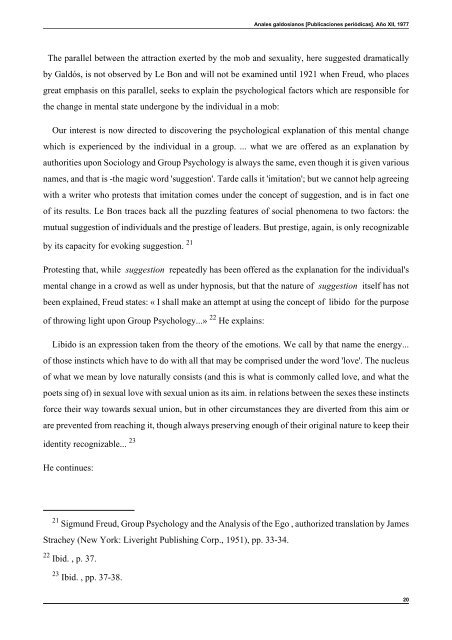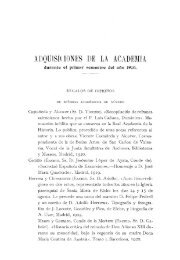Create successful ePaper yourself
Turn your PDF publications into a flip-book with our unique Google optimized e-Paper software.
Anales galdosianos [Publicaciones periódicas]. Año XII, 1977<br />
The parallel between the attraction exerted by the mob and sexuality, here suggested dramatically<br />
by <strong>Galdós</strong>, is not observed by Le Bon and will not be examined until 1921 when Freud, who places<br />
great emphasis on this parallel, seeks to explain the psychological factors which are responsible for<br />
the change in mental state undergone by the individual in a mob:<br />
Our interest is now directed to discovering the psychological explanation of this mental change<br />
which is experienced by the individual in a group. ... what we are offered as an explanation by<br />
authorities upon Sociology and Group Psychology is always the same, even though it is given various<br />
names, and that is -the magic word 'suggestion'. Tarde calls it 'imitation'; but we cannot help agreeing<br />
with a writer who protests that imitation comes under the concept of suggestion, and is in fact one<br />
of its results. Le Bon traces back all the puzzling features of social phenomena to two factors: the<br />
mutual suggestion of individuals and the prestige of leaders. But prestige, again, is only recognizable<br />
by its capacity for evoking suggestion. 21<br />
Protesting that, while suggestion repeatedly has been offered as the explanation for the individual's<br />
mental change in a crowd as well as under hypnosis, but that the nature of suggestion itself has not<br />
been explained, Freud states: « I shall make an attempt at using the concept of libido for the purpose<br />
of throwing light upon Group Psychology...» 22 He explains:<br />
Libido is an expression taken from the theory of the emotions. We call by that name the energy...<br />
of those instincts which have to do with all that may be comprised under the word 'love'. The nucleus<br />
of what we mean by love naturally consists (and this is what is commonly called love, and what the<br />
poets sing of) in sexual love with sexual union as its aim. in relations between the sexes these instincts<br />
force their way towards sexual union, but in other circumstances they are diverted from this aim or<br />
are prevented from reaching it, though always preserving enough of their original nature to keep their<br />
identity recognizable... 23<br />
He continues:<br />
21 Sigmund Freud, Group Psychology and the Analysis of the Ego , authorized translation by James<br />
Strachey (New York: Liveright Publishing Corp., 1951), pp. 33-34.<br />
22 Ibid. , p. 37.<br />
23 Ibid. , pp. 37-38.<br />
20

















